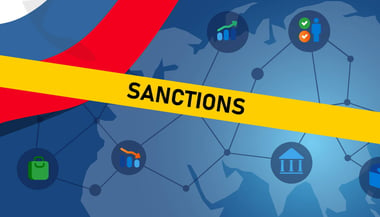The Importance of Sanctions Screening in Today's Global Economy
In today's interconnected world, businesses are increasingly operating on a global scale. With this expansion comes the need for companies to comply with international regulations, including sanctions screening. In this article, we will explore the importance of sanctions screening in today's global economy and how it can help businesses avoid costly penalties and reputational damage.
What is Sanctions Screening?
Sanctions screening is the process of checking individuals, entities, and transactions against government-issued lists of sanctioned parties. These lists are created and maintained by various government agencies, such as the United States Department of the Treasury's Office of Foreign Assets Control (OFAC) and the European Union's Consolidated List of Sanctions.
The purpose of sanctions screening is to prevent businesses from engaging in transactions with individuals or entities that are involved in illegal activities or pose a threat to national security. These individuals and entities may be subject to financial sanctions, travel restrictions, or other penalties.
Why is Sanctions Screening Important?
Sanctions screening is crucial for businesses operating in today's global economy for several reasons.
Avoiding Penalties and Legal Consequences
The most obvious reason for conducting sanctions screening is to avoid penalties and legal consequences. Non-compliance with sanctions regulations can result in hefty fines, criminal charges, and damage to a company's reputation.
For example, in 2019, Standard Chartered Bank was fined $1.1 billion for violating U.S. sanctions against Iran. This penalty serves as a reminder of the severe consequences of non-compliance with sanctions regulations.
Protecting Reputations
In addition to financial penalties, non-compliance with sanctions regulations can also damage a company's reputation. In today's digital age, news of sanctions violations can spread quickly, leading to negative publicity and loss of trust from customers and partners.
Ensuring Ethical Business Practices
Sanctions screening also helps businesses ensure that they are not engaging in unethical business practices. By screening individuals and entities against government-issued lists, companies can avoid doing business with parties involved in illegal activities, such as human rights violations or terrorism.
The Role of Technology in Sanctions Screening
With the increasing complexity and volume of global transactions, manual sanctions screening is no longer a viable option for businesses. Instead, companies are turning to technology to streamline the process and ensure compliance.
Automated Sanctions Screening
Automated sanctions screening involves using software to check individuals, entities, and transactions against government-issued lists. This technology can quickly scan large volumes of data and flag any potential matches, allowing businesses to take appropriate action.
Sanctions and PEP Screening
In addition to sanctions screening, businesses also need to conduct Politically Exposed Person (PEP) screening. PEPs are individuals who hold prominent public positions or have close ties to government officials. These individuals may be at a higher risk of engaging in corrupt activities, making it crucial for businesses to screen them before engaging in any transactions.
Best Practices for Sanctions Screening
To ensure effective sanctions screening, businesses should follow these best practices:
Regular Screening
Sanctions lists are constantly changing, with new individuals and entities being added or removed. Therefore, businesses should conduct regular screenings to ensure they are not engaging in transactions with sanctioned parties.
Screening All Parties Involved in a Transaction
It is essential to screen not only the individuals and entities directly involved in a transaction but also any intermediaries or third parties. This will help businesses avoid indirect violations of sanctions regulations.
Implementing a Risk-Based Approach
Not all transactions carry the same level of risk. Therefore, businesses should implement a risk-based approach to sanctions screening, focusing on high-risk transactions and parties.
Maintaining Accurate Records
Businesses should keep accurate records of their sanctions screening processes, including any potential matches and the actions taken. This will help demonstrate compliance in case of an audit or investigation.
Real-World Examples of Sanctions Screening
One example of the importance of sanctions screening is the case of ZTE Corporation, a Chinese telecommunications company. In 2018, the company was fined $1.19 billion for violating U.S. sanctions against Iran and North Korea. This penalty serves as a reminder of the need for businesses to conduct thorough sanctions screening to avoid costly consequences.
Another example is the case of Danske Bank, a Danish bank that was involved in a money-laundering scandal. The bank was accused of failing to conduct proper sanctions screening, resulting in billions of dollars being laundered through its Estonian branch. This scandal led to significant financial and reputational damage for the bank.
Who is Responsible for Sanctions Screening?
The responsibility for sanctions screening falls on various individuals within a company, including:
- Compliance Officers: Compliance officers are responsible for ensuring that the company is following all relevant regulations, including sanctions screening.
- Legal Counsel: Legal counsel can provide guidance on sanctions regulations and help ensure that the company is compliant.
- Risk Managers: Risk managers can help identify high-risk transactions and parties that require additional scrutiny.
- IT Professionals: IT professionals are responsible for implementing and maintaining the technology used for sanctions screening.
Sanctions Screening Tool by Tookitaki
One popular sanctions screening solution is Tookitaki's Smart Screening. This tool uses advanced algorithms and machine learning to identify potential matches accurately and reduce false positives. It also provides real-time screening.
In today's global economy, sanctions screening is a crucial aspect of compliance for businesses. With the ever-changing landscape of sanctions regulations, it is essential for businesses to stay vigilant and regularly conduct screenings to ensure compliance. By implementing best practices and using technology such as Tookitaki's Smart Screening, companies can ensure they are not engaging in transactions with sanctioned parties and avoid costly penalties and reputational damage.
Click below to speak with our experts today and discover how our Smart Screening solution can transform your compliance strategy.
Sanctions Screening with Tookitaki?





